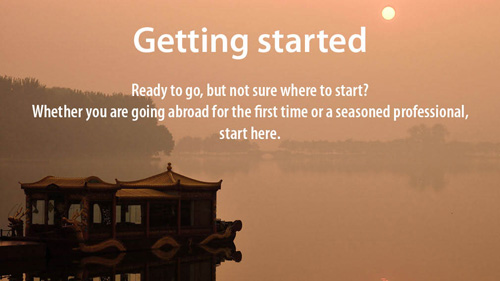Even if you haven’t experienced it before, you’ve likely heard about culture shock. This is a normal process that people go through when adapting to a new culture. Even though there is no way to avoid culture shock, it is a good idea to familiarize yourself with the symptoms and acknowledge that there will be a period of some struggle and adaptation at the beginning of your time abroad.
Stages of Culture Shock
The good news is that there is a beginning, middle and end to the culture shock process, with distinct stages that follow a U-shaped curve. However, each person’s experience is unique and the time it takes to pass through each stage may vary considerably based on your individual experience and circumstances. Recognizing where you are on the curve and what lies ahead can be helpful.
Stage 1: Honeymoon
This is the stage when you first arrive in a new culture and everything is new and exciting. Things may seem exotic and you usually have lots of positive impressions. This can last a few days, weeks or even longer.
Stage 2: Shock
Once the initial euphoria of coming home begins to wear off, you may start to experience feelings of frustration, bitterness, homesickness or isolation. This stage represents the physical, psychological and social upset of entering and settling into a new culture. Symptoms may manifest differently for people, but the cause is the same. You might experience actual physical discomfort and in extreme cases some people even become depressed. This phase is definitely the most challenging part of the process and can be fleeting or protracted. Be patient and give yourself time to adjust. There is light at the end of the tunnel.
Symptoms of Culture Shock
Everyone experiences culture shock differently. Below are some common symptoms that may indicate you are going through this process. If you are having a hard time coping it can be helpful to talk to other people who have had similar experiences. Common symptoms can include:
Anger
Confusion
Discomfort
Boredom
Restlessness
Irritability
Difficulty communicating
Negative feelings about your host culture
Hyper-emotional
Feeling withdrawn or the the need to be alone
Avoiding locals and only spending time with foreigners
Difficulty concentrating and working effectively
Fatigue
Insomnia
Stomachaches and headaches
Stage 3: Adaptation
Eventually you will process the shock and slowly begin to adapt to your new situation. You will know you are entering this phase when you start to feel comfortable in the new culture and begin to engage in activities that will help you integrate socially. Learning the language, making new friends and participating in community activities are all signs that you are successfully adapting.
Strategies for Coping with Culture Shock
The best strategy for coping with culture shock is to prepare yourself for it. Recognize the symptoms and research everything you can about your host culture to prepare as best you can before you arrive. When you do begin to struggle, use some of the tips below to help work through your feelings.
How to Cope with Culture Shock
Be patient and kind to yourself: this is a normal experience and you shouldn’t feel bad about experiencing these difficulties. Writing things down in a journal can be a helpful way to process some of your feelings.
Stay healthy: eat well, exercise, get enough rest, consume alcohol in moderation and foster healthy habits. It can do wonders to make you feel better.
Build and use your support system: share your feelings with people who can relate, keep in touch with family and friends at home and develop relationships with local people.
Learn the language: being able to communicate effectively will help you make friends, integrate into your new community and understand cultural nuances.
Get involved: engage in social activities or classes that help you learn about the culture and meet new people.
Culture shock is a process of learning and internal growth. You have to go through it, but you will come out stronger on the other side. After this experience you may be able to adapt more easily to being outside of your comfort zone and may have an expanded view of the world and where your home culture fits in it. So do your best to prepare yourself--you might even consider creating a plan of some strategies you think might work for you so that they are readily available when you need them.



